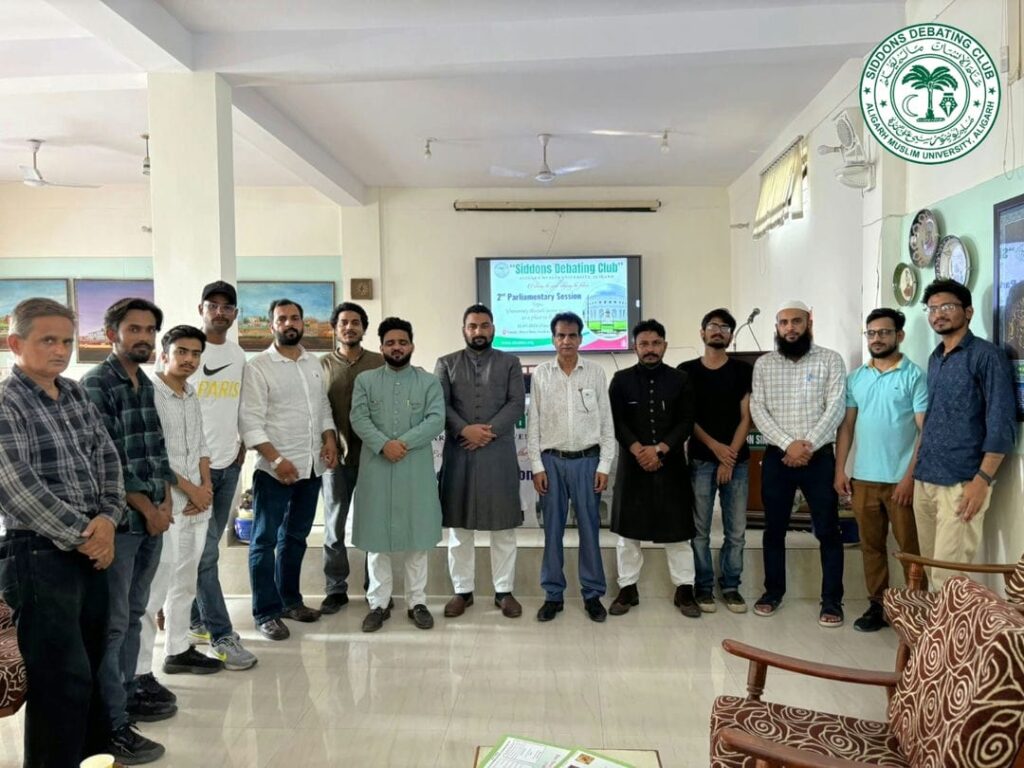
On 16 September 2024, the Siddons Debating Club organized a Panel Discussion on the pressing theme of Women’s Safety and Privacy. The discussion titled, “Safety and Privacy Concerns in Girls’ Hostels: Conflicts and Challenges”. The discussion was moderated and Attended by Female Student from different Departments, Courses, and Universities. The discussion attracted a diverse audience as well to discuss the complex issues surrounding safety, privacy, and the conflict between gender specific living spaces and gender-inclusive employment.
The Discussion revolved around the foundational theme of Women’s Safety in Girls’ Hostel Spaces and maneuvered through discussing various sub-themes and cultural perspectives resulting in a thought-provoking dialogue reflecting personal as well as shared perspectives of the speakers regarding the topic.
The Discussion Started at 07:00 p.m., with the introduction of the topic by Gulafshan Islam (moderator). The floor for discussion was then opened.
The first speaker summarised the main issues and challenges, pointed towards the key concerns, she proposed having strong security to prevent unauthorized entry, dealing with privacy issues in shared rooms and common areas, and addressing problems like harassment and bullying. She stated that It’s also crucial to have good emergency plans, support for mental health, and to manage different cultural and personal practices well. Training for hostel staff is essential to handle these issues properly. A clear set of rules, good communication, and support systems are needed to make sure the hostel is safe and respectful for everyone.
Midhat Fatima (Student) brought into the discussion, the importance of the right to privacy as a fundamental human right, essential for maintaining personal boundaries and a sense of security. The speaker stated that the shared nature of hostel life frequently leads to a notable reduction in personal space and privacy, raising concerns about security and comfort. In today’s climate, where awareness of crimes against women is heightened, the presence of male staff in female hostels can be a source of anxiety. In many hostels, most of the staff are male, with few female workers. This lack of female presence can exacerbate feelings of vulnerability. The speaker acknowledged that “While it is important not to cast aspersions on male staff members, the concern for privacy and safety remains paramount”. In conclusion, the speaker suggested that increasing the number of female staff could help mitigate these concerns.
Another Speaker, Pooja Singh (Research Scholar) argued that how the issue of women’s safety in academic institutions and hostel spaces has long been approached reactively, with heightened attention only when high-profile cases of violence, such as rape, surface. However, she argued, the prevalence of crimes against women — with reports of a rape every 15 minutes —indicates that sporadic outrage and temporary measures are insufficient. Advocating for a long-term solution, the
speaker stated “The key to sustainable safety lies not in waiting for crises to emerge, but in proactively empowering every woman through continuous training and self-defense education.” This protective mindset leaves women dependent on male figures for security, creating environments in academia and society where they are often outnumbered or outmanoeuvred, exacerbating the risks of violence. To address this, we must shift from a protection-based approach to one of empowerment, where women are equipped to safeguard themselves without external reliance. The speaker argued for “an Empowerment-oriented solution” rather than “a Welfare approach”. She opined that “By shifting the focus from reactive measures to continuous self-empowerment, we can create academic and hostel spaces where women feel inherently secure, and where crimes against them decrease not because of protective barriers, but because they have the skills and confidence to defend themselves at every moment. This proactive, lifelong commitment to training and empowerment will ensure that women are not merely surviving, but thriving, in safe academic environments.”
Aleena Maryam (Student) questioned the privacy invasion in shared spaces such as hostels. The speaker pointed out that increasing participation of women employment in Gender-specific spaces is a way to ensure the empowerment of women while simultaneously tackling the issue of women’s safety to some extent.
Mehar Ahmad (Student) started by raising a fundamental question about the need to actively discuss this crucial and important topic, she pointed out that the provision of safety and privacy are both basic human rights. Talking about the Hostel spaces, she exclaimed that “though it is safer, it is not safe”. The Speaker premised her points on various facets that exacerbate the situation in Girls’ Hostels, such as the mass male employment in the premises of women’s residential is a concern of many especially women who practice purdah. Traditional jobs catering, sweeping, and kitchen work are given to men. Resonating with another speaker She also pointed towards the restraining culture in the hostels, “It reaches the extent that medical and emergency outings are rejected.” Advocating proactive empowerment, the speaker argued that “excessive safety measures lead to psychological bondage in the minds of young girls who are deprived of self-confidence, exposure, social connections, and networking.” The speaker concluded by quoting that- “The beginning of reform is not toleration but liberty”. And suggesting that there should be a balance between Safety andFreedom.
Conclusion:
Key Takeaways-
- The authorities should reconsider the issues of safety and privacy through the lens of
fundamental human rights, reaffirming the paramount importance. - The importance of considering cultural differences while dealing with the issues.
- The importance of physical as well as mental safety, and safety from bullying inside the hostel premises.
- Establishment of strict surveillance practices, ensuring a check on any unauthorized entry, and proper CCTV surveillance.
- Maintenance of personal boundaries in shared hostel spaces, balance between individual and collective privacy.
- Need to rethink the male-dominated employment in gender-specific living spaces. Inclusion of women employees even in traditionally male-dominated jobs, could be a way to empower women at large and at the same time, ensure the Safety and Privacy of students in Girls’ Hostels.
- Proactive and long-term solutions oriented towards empowerment rather than welfare and restraining culture.
- Self-defence training and gender sensitization should be a part of the curriculum.
The panel discussion successfully highlighted the complex balance between ensuring safety and upholding privacy in women’s hostels. The SDC facilitated an open and nuanced conversation that illuminated the challenges faced by the female students living in hostels in particular and women in general, and it fostered dialogue on how these concerns can be addressed more effectively in the future.


